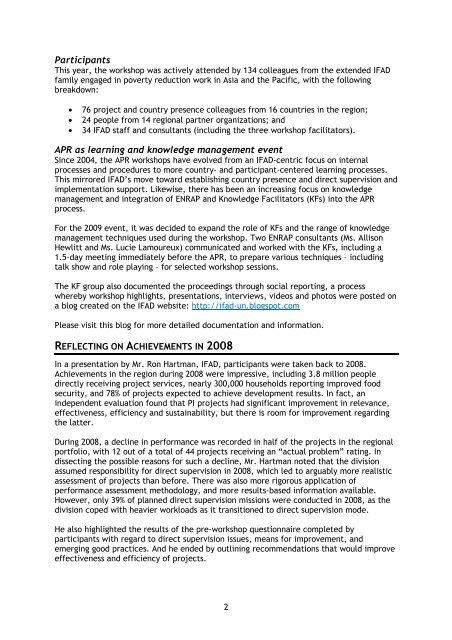Workshop Report pdf - IFAD
Workshop Report pdf - IFAD
Workshop Report pdf - IFAD
You also want an ePaper? Increase the reach of your titles
YUMPU automatically turns print PDFs into web optimized ePapers that Google loves.
Participants<br />
This year, the workshop was actively attended by 134 colleagues from the extended <strong>IFAD</strong><br />
family engaged in poverty reduction work in Asia and the Pacific, with the following<br />
breakdown:<br />
• 76 project and country presence colleagues from 16 countries in the region;<br />
• 24 people from 14 regional partner organizations; and<br />
• 34 <strong>IFAD</strong> staff and consultants (including the three workshop facilitators).<br />
APR as learning and knowledge management event<br />
Since 2004, the APR workshops have evolved from an <strong>IFAD</strong>-centric focus on internal<br />
processes and procedures to more country- and participant-centered learning processes.<br />
This mirrored <strong>IFAD</strong>’s move toward establishing country presence and direct supervision and<br />
implementation support. Likewise, there has been an increasing focus on knowledge<br />
management and integration of ENRAP and Knowledge Facilitators (KFs) into the APR<br />
process.<br />
For the 2009 event, it was decided to expand the role of KFs and the range of knowledge<br />
management techniques used during the workshop. Two ENRAP consultants (Ms. Allison<br />
Hewlitt and Ms. Lucie Lamoureux) communicated and worked with the KFs, including a<br />
1.5-day meeting immediately before the APR, to prepare various techniques – including<br />
talk show and role playing – for selected workshop sessions.<br />
The KF group also documented the proceedings through social reporting, a process<br />
whereby workshop highlights, presentations, interviews, videos and photos were posted on<br />
a blog created on the <strong>IFAD</strong> website: http://ifad-un.blogspot.com<br />
Please visit this blog for more detailed documentation and information.<br />
REFLECTING ON ACHIEVEMENTS IN 2008<br />
In a presentation by Mr. Ron Hartman, <strong>IFAD</strong>, participants were taken back to 2008.<br />
Achievements in the region during 2008 were impressive, including 3.8 million people<br />
directly receiving project services, nearly 300,000 households reporting improved food<br />
security, and 78% of projects expected to achieve development results. In fact, an<br />
independent evaluation found that PI projects had significant improvement in relevance,<br />
effectiveness, efficiency and sustainability, but there is room for improvement regarding<br />
the latter.<br />
During 2008, a decline in performance was recorded in half of the projects in the regional<br />
portfolio, with 12 out of a total of 44 projects receiving an “actual problem” rating. In<br />
dissecting the possible reasons for such a decline, Mr. Hartman noted that the division<br />
assumed responsibility for direct supervision in 2008, which led to arguably more realistic<br />
assessment of projects than before. There was also more rigorous application of<br />
performance assessment methodology, and more results-based information available.<br />
However, only 39% of planned direct supervision missions were conducted in 2008, as the<br />
division coped with heavier workloads as it transitioned to direct supervision mode.<br />
He also highlighted the results of the pre-workshop questionnaire completed by<br />
participants with regard to direct supervision issues, means for improvement, and<br />
emerging good practices. And he ended by outlining recommendations that would improve<br />
effectiveness and efficiency of projects.<br />
2
















